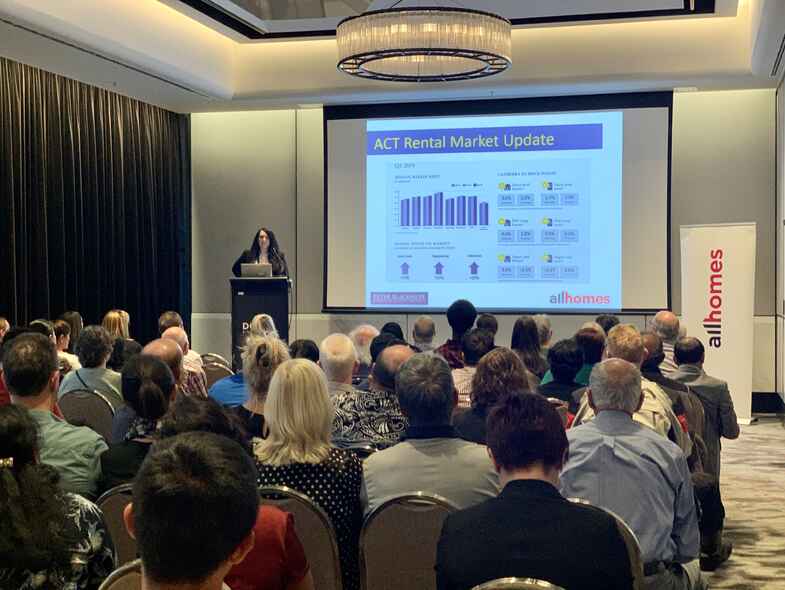A solid investment portfolio is all about up-to-date information and relevant insights. With this in mind, PBRE’s recent information session, open to both clients and the general public, was designed to provide landlords in Canberra with key insights and up-to-date facts on the existing and proposed aspects of the ACT Residential Tenancies Act.
This first information session, booked out within only a few hours of promotion, welcomed a range of investors, including clients from every region of the Peter Blackshaw network.
Warmly hosted by Queanbeyan and Jerrabomberra Principal Alex Ah Key and Manuka Senior Property Manager Courtney Baker, the event provided an opportunity to meet team members from all our offices. The Q&A session at the end of the evening was particularly engaging, with a diverse range of queries and concerns raised that generated further discussion amongst the attendees after the event.
ACT Housing Policies currently outline the legal framework that dictates owner care, control, welfare, licensing, disease control and quiet enjoyment of their animals and pets. This includes relevant environmental protection and disability considerations. The evening focused on a number of specific amendments made to the Act and effective from 1 November 2019.
REIACT Survey
We’ve been advised by REIACT that a survey has been developed to track the impact on the market, such as the type of properties sold/onsold to both the owner/occupier and investment market. Landlords and homeowners are encouraged to participate in this confidential open survey which will be available for a 12-month period, from January 2020 regarding sales from 1 November 2019.
Please note that AllHomes currently doesn’t gather any information related to market impact from these Bill amendments however REIACT has plans to coordinate online access to the survey from the AllHomes platform.
Pet Ownership
All tenants throughout the ACT may now own pets. Under the new laws, a landlord cannot ban pets completely and can only refuse consent it approved by ACAT. A number of test case queries are currently being processed by ACAT. If the tenancy agreement does not have a provision about pets, the tenant may have a pet without the permission of the landlord. Owners are urged to check their existing insurance policies to ensure they cover animals.
Under ACT law, most pets must be registered, microchipped and de-sexed. ACT Housing Policies currently outline the legal framework that dictates owner care, control, welfare, licensing, disease control and quiet enjoyment of their animals and pets. This includes relevant environmental protection and disability considerations.
Special Modifications
Changes to the property are called modifications, of which there are two categories: general modification and special modifications. Special modifications include minor modifications and those related to safety, security, disability, energy efficiency or telecommunications access. General modifications are any other kind of modification to the property.
The rules for seeking consent from the landlord for general modifications and for special modifications are different. Landlords can refuse consent to special modifications (including minor modifications) only with the approval of the Tribunal. Landlords can refuse consent for general modifications, but they must not refuse consent unreasonably. For all modifications, the landlord may impose a reasonable condition on consent (e.g. require a work standard that minimises damage to the property, is completed by a qualified tradesperson and must be restored at the end of the tenancy).
For further information see the ACT Government factsheet on changes to modifications.
Break Lease Fees
A residential tenancy agreement may include a ‘break lease clause’, that requires the tenant to pay a ‘break fee’ if they want to end the tenancy early. This fee varies depending upon the term of the tenancy agreement and how much time is left on the agreement.
It is also reduced if the landlord finds a new tenant within a set period of time after the tenancy is terminated by the original tenant. As a default, the break lease fee will be either six weeks or four weeks rent, depending on when the tenancy was terminated.
For further information see the ACT Government factsheet on changes to break fees.
Rent Increases
The terms of existing agreements will not change, but the way those terms operate might be affected by changes to the RTA. Residential tenancy agreements made after the new laws have commenced will include the new standard terms. Under a fixed term tenancy agreement, rent may not be increased during the fixed term unless the amount of the increase (or the method for working it out) is set out in the agreement.
Rent may not be increased outside of a fixed term agreement at intervals of less than 12 months. Generally, a rental rate increase is presumed to be excessive if it is more than the amount set under the legislation: the ‘prescribed amount.’ If a rental increase is less than this prescribed amount, the tenant must satisfy the Tribunal that the increase is excessive.
For further information see the ACT Government factsheet on changes to rent increases.
Relevant Links
Residential Tenancies Amendment Bill 2019
Animal Welfare Amendment Bill 2019
ACT Housing Policies for Animals and Pets
AllHomes provide a thorough breakdown of property ownership throughout Canberra, within each individual suburb snapshot (for example, this recent Campbell listing)





